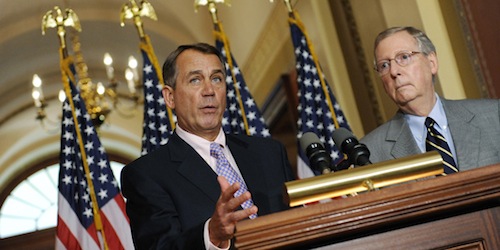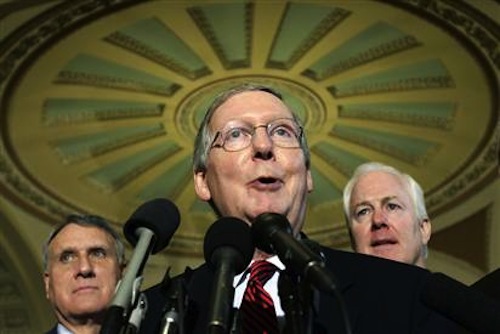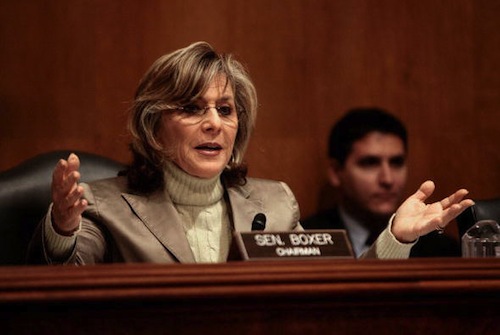Remember on Friday when we declared American politics too selfishly broken to address the basic management of the United States? It turns out we were wrong, because the President and congressional leaders reached a deal on the national debt ceiling last night. The package still needs the support of both houses—including several notoriously intransigent members—but tentatively, maybe even presumably, the lights are going to stay on. “Sausage making is not pretty,” Diane Feinstein told the Times. “But the sausage we have, I think, is a very different sausage from when we started.” And in the end, isn’t that what we all what from our food? Different?
Category Archives: Politics versus Government
Terrify yourself with graphs and arguments that cannot be evaluated

The Gang of Six, a coalition of Democratic and Republican legislators who might do something and the economy will collapse or not
Remember when we gave the government a monopoly on force and authorized various representatives to collect and disburse resources on our behalf? It’s possible that was a mistake. Either that or it’s business as usual on the reeking shores of the Potomac, and the leaders of both parties are holding our national anxiety level hostage for whatever advantage they can derive without pushing us to real crisis. It’s difficult for the layperson to decide just how seriously to take our present negotiations over the debt ceiling. Economists agree that a default would wreak awful damage on the economy, except the markets haven’t really responded. Congress raises the limit pretty much every year, except for the last two weeks the President has been walking out of meetings and Eric Cantor has whined like a young lady who needs a nap. The GOP refuses to consider any revenue increases even as they accuse the President of intransigence, and Harry Reid is a wiener. So whom, to paraphrase the Joker, do you trust?
McConnell proposes Faustian bargain
As the August 3rd deadline to either raise the federal debt ceiling or submit to our Chinese masters nigh approaches, Mitch McConnell has proposed a new solution: Congress could authorize President Obama to increase the borrowing limit himself. The Senate Minority Leader suggested that the President be given the authority to allow an additional $2.4 trillion in debt over the next year, provided he specifies an equal amount in spending cuts. It’s an odd move, given that negotiations have foundered for weeks on Republican demands that the President agree to cuts before the ceiling is raised. Unless you are a Republican, in which case negotiations have foundered on the President’s insistence that 25% of the increase be covered by taxes on corporations and the wealthy.
The last days of Starve the Beast
One of my particular favorite terrified theories about the Republican party is Starve the Beast, the fiscal/political strategy developed by small-government thinkers in the late 1970s. Depending on whom you ask, Starve the Beast is either a widely accepted conservative tactic or a paranoid fantasy of the left, although if the last couple of years have taught us anything, it’s that those two categories can overlap. The idea behind S the B is simple: cutting social welfare and other spending programs is not popular, but cutting taxes is. Ergo, the best way to reduce the size of the federal government is to steadily reduce taxes, until the political pressure created by mounting deficits forces cuts in spending. It sounds kind of evil and crazy when I put it that way, as if the GOP were deliberately bankrupting the federal government in order to get the budget cuts it couldn’t secure by democratic means. Maybe it would be better to let someone more respected explain it, like 1978 Alan Greenspan:
Let us remember that the basic purpose of any tax cut program in today’s environment is to reduce the momentum of expenditure growth by restraining the amount of revenue available and trust that there is a political limit to deficit spending.
Oh, wait. That sounds evil and crazy, too.
S. 782 offers terrifying glimpse of how a bill becomes a law
Yesterday, the US Senate voted on S. 782, a bill to reauthorize and fund the Economic Development Administration. The EDA has been around for forty years and commands a paltry $300 million budget, but S. 782 died in a 49-51 vote due to what The Hill calls “100 mostly nongermane amendments offered by Republicans and Democrats.” What was supposed to be an innocuous or even benign “jobs bill”—and those scare quotes should be taken as extremely frightened—sunk under an accumulation of proposed additions, including amendments to suspend Obamacare, repeal last year’s financial regulatory reforms, block the Department of the Interior from declaring the prairie chicken an endangered species, and abolish the Economic Development Administration. Jim DeMint proposed that last one, and I don’t imagine he did it with a straight face. After much debate and a speech about the importance of Rhode Island’s Gaspee Days, S. 782 died a lugubrious death. It was a hard outcome for the bill’s sponsor, Barbara Boxer (D–CA,) who just that morning opined that “this is a moment we can show we do what we say we are going to do. I am hopeful this bill doesn’t die today.”




